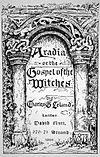Portal:Feminism/Selected article/10
Aradia, or the Gospel of the Witches is an 1899 book by Charles Godfrey Leland. The book is an attempt to portray the beliefs and rituals of an underground religious witchcraft tradition in Tuscany that had survived for centuries until Leland's claimed discovery of its existence in the 1890s. Scholars have disputed the veracity of this claim. Still, the book has become one of the foundational texts of Wicca and Neo-paganism. Its fifteen chapters portray the origins, beliefs, rituals and spells of an Italian pagan witchcraft tradition. The central figure of that religion is the goddess Aradia who came to Earth to teach the practice of witchcraft to oppressed peasants in order for them to oppose their feudal oppressors and the Christian church. Leland's work remained obscure until the 1950s, when other theories about, and claims of, "pagan witchcraft" survivals began to be widely discussed. Aradia began to be examined within the wider context of such claims. Scholars are divided, with some dismissing Leland's assertion regarding the origins of the manuscript, and others arguing for its authenticity as a unique documentation of folk beliefs.

